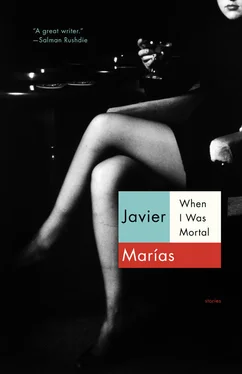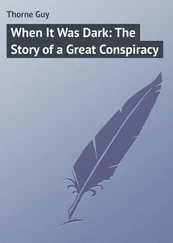When she was not with us, he was more forthcoming, much more than he was in his letters too, which were affectionate but restrained, indeed at times they were so intensely laconic that — like the taut skin and the swollen veins on his forehead — they seemed to presage some explosion, an explosion that would take place outside the envelope, in real life. It was during such a meeting, when Eliane was not with us, that he first spoke to me of the violent rages to which he was subject and which I always found so hard to imagine given that, over the thirteen or fourteen years I knew him, I was never a witness to one, although it’s true that we saw each other only infrequently and that his life seems to me now like a defective copy of a book, full of blank pages, or like a city that one has driven through many times before but always at night. Once he told me about a recent visit to Barcelona and how he’d borne in silence for as long as he could his father’s absurd words of advice — his father was separated from Xavier’s mother and had remarried — and how, then, in a sudden fit of rage, he’d started wrecking the house, hurling furniture against walls, tearing down chandeliers, ripping up paintings, demolishing shelves and, of course, kicking in the television set. No one stopped him; he simply calmed down of his own accord after a few cataclysmic minutes. He took no pleasure in telling me this, but neither did he show any regret or sorrow. I met his father in Paris together with his new Dutch wife, who wore a diamond stud in her nose (a woman ahead of her time). His father’s name was Ernest and the only thing he had in common with Xavier was the prominent forehead: he was much taller and had black hair with not a trace of grey in it, possibly dyed, he was a vain man, indulgent and easy-going, but slightly disdainful of his own son, whom he evidently didn’t take at all seriously, although that may not have meant much, since he obviously didn’t take anything very seriously. He was like an eternal spoiled child, still keen on riding competitions, skeet shooting and — at the time — leafing through treatises on Hindu philosophy; he was one of those people, increasingly rare nowadays, who seemed to spend his entire life lounging around in a silk dressing gown. Xavier didn’t take his father very seriously either, but he couldn’t treat him with the same disdain, partly because his father irritated him so much, but also because he just hadn’t inherited that particular characteristic.
It was on another occasion when Eliane was absent, about two or three years after our first meeting, that Xavier told me about the death of their newborn child, possibly, I can’t quite remember, strangled by its own umbilical cord, but no, it wasn’t that, because I recall now one of his extremely rare remarks on the subject (he hadn’t even told me they were expecting a baby): “It’s much worse for Eliane than it is for me,” he said. “I don’t know how she’s going to react. The worst thing is that the child did actually live, so we can’t just forget about it, we’d already given it a name.” I didn’t ask him what that name was, so that I wouldn’t have to remember it too. Years later, talking about something else entirely — but perhaps not thinking about that something else — he wrote to me: “There is nothing more repellent than having to bury something that has only just been born.” He had still not separated from Eliane — or Eliane from him — when he spoke to me one day about a literary project of his that would require an experiment. He said: “I’m going to write an essay on pain. I thought at first that I’d make it a strictly medical treatise and entitle it Pain, Anaesthesia and Diathesis , but I want to go beyond that. What really interests me about pain is its mystery, its ethical nature and how to describe it in words, all of which is easily within my grasp. I’ve decided that in a few days’ time I’ll stop taking the medication for my depression and see what happens, see how long I can bear it, and simply observe the process of my mental pain, which always ends up taking on various physical manifestations, the worst of which are the excruciating migraines. The term ‘migraine’ always seems to be taken rather lightly, doubtless because of that old joke about headaches and dissatisfied wives, but it actually describes one of the greatest sufferings known to man. There is a possibility that if I want to stop the experiment at some point, it might already be too late, but I can’t not do this research.” Xavier Cornelia had continued to write — novels, poetry and an epistemology, as well as what he called “night watches”. Of all this work, the only piece we’d finally managed to get accepted for publication, by the Madrid publishing house that had brought us together in the first place, was his novel Vivisection , a much longer book than the one I’d read. Nevertheless, owing to endless delays, it had still not seen the light of day, and he was now working on a translation of Burton’s Anatomy of Melancholy , commissioned by the same publishing house, who had chosen him for the task partly because of his profession. He was, therefore, still an unpublished author and, from time to time, he would despair, decide that he wanted to remain unpublished and cancel contracts only to have them drawn up all over again at a later date. Fortunately, his publisher was a patient man, both kindly and prepared to take risks, a combination almost unknown in the publishing world. “Aren’t you curious to see your book in print?” I asked. “Of course I am,” he replied, “but I can’t wait. Besides,” he added, with his usual precision, “once I’ve finished the essay on pain, I’ll have completed sixty per cent of my work.” I said: “The day we met, you told me that without the medication you’d probably kill yourself and, if that happened, you’d only have completed fifty per cent, perhaps less, depending on the percentage you give your essay. And fifty per cent really isn’t very much, is it?” He gave that delayed laugh of his and said, slipping into the oddly naive idiom he occasionally resorted to: “Honestly, the things you come out with …” I didn’t feel particularly worried, since I’d always believed that he was exaggerating when he described the more dramatic and spectacular incidents in his life.
Over the following months, his letters became even more austere than usual and his childish writing more of a hasty scribble. Only at the end of those letters would he add a few words about himself or his state of health or about how his experiment was going: “At the present time, the maximum speed at which we are travelling towards the future remains insufficient and we grow old not with respect to the future but with respect to our past. My future perfect can’t wait to arrive, my past perfect is unstoppable.” Or: “I’ve always lived with the fear that one day I would have to fall silent, for good. As you see, my friend, I’m more of a coward than ever.” But shortly after that, he wrote: “Every day I grow more invulnerable inside and more combustible outside.” And later on again: “The most heroic quality in man is not perhaps to live or to die but to endure.” And in the letter following that: “What will they think of us? What do we think of ourselves? What will you think of me? I don’t want to know. But the questions provoke a slight feeling of depression. That’s all.” “As I said to you in the course of our conversation outside the Jardin du Luxembourg,” he said once, referring to the work he was about to embark upon, “my way into the subject entails provoking a relapse into endogenous colic and when the meandering route followed by my first seventy commentaries leads you at last to the final one, you will understand the reason why, especially if you remember what I told you about the exceptional circumstances of my illness. This new descent into Hades is a touch foolish and I’d be the first to reproach myself with that, but why fish for tuna when you could be catching shark?” And later: “I’m not ill again . It’s a continuation of the same illness.” He had to abandon the experiment sooner than expected. He’d estimated that it would take six months to reach crisis point but, after only a month, he had to be hospitalized for two weeks, unable to carry on without his medication and still without enough material to start writing. I know that both his family and his doctors rebuked him sharply.
Читать дальше












